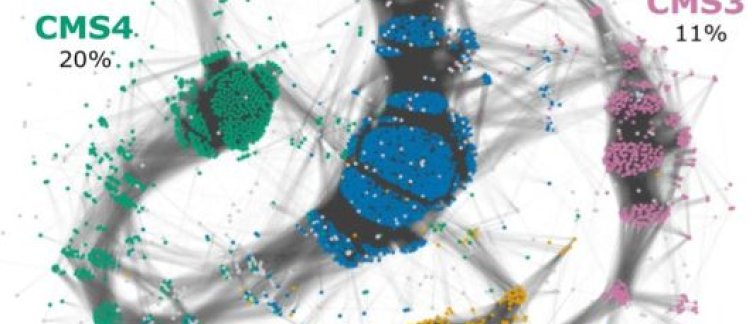Colorectal cancer is a complex disease, and the course of the disease and response to treatment differs vastly among individual patients. A significant number of patients do not benefit from the prescribed treatment regimens, red flagging an urgent need to find better ways to match patients with available therapies. Current clinical classification systems involving disease stage and other features fail to predict how patients will respond to various treatments.
To improve the classification of colorectal cancer patients, an international consortium including researchers at Cancer Center Amsterdam previously identified four biological subtypes of colorectal cancer based on the analysis of gene expression profiles in tumors. This molecular classification of subtypes is called the ‘consensus molecular subtypes’ or CMS.
Current clinical practice does not usually take CMS into account. However, the CMS classification scheme has been extensively employed in translational research and clinical studies exploring treatment optimization. Sanne ten Hoorn, Tim de Back, Dirkje Sommeijer and project leader Louis Vermeulen have published a paper in the Journal of the National Cancer Institute summarizing all of these studies, and performed meta-analyses to explore the association of individual subtypes with specific therapies.
Their comprehensive overview confirmed the prognostic and predictive significance of CMS. “Our analysis revealed that the most effective therapy for the various subtypes differs,” says first author Sanne ten Hoorn. “This provides direct insight in which drugs are most effective in which patients.” Adding CMS analysis to standard clinical care is likely to enable better selection of existing and new chemotherapy regimens for individual patients, with the potential to significantly improve health outcome.
Clinical implementation of CMS is not without challenges: at this stage it is time-consuming, costly, and its cost-effectiveness has yet to be demonstrated. However, the authors argue that evolving technological advances will bring CMS within reach of the clinic soon.
Prof. Louis Vermeulen: “Once CMSs are sufficiently validated in prospective clinical trials, they could have great impact on improving and tailoring treatment strategies for the individual colorectal patient in the future.”
Read the paper: https://academic.oup.com/jnci/advance-article/doi/10.1093/jnci/djab106/6291249
For more information contact Louis Vermeulen: < l.vermeulen@amsterdamumc.nl>
People involved:
Tim de Back (CCA)
Dirkje Sommeijer (CCA)
Sanne ten Hoorn (CCA)
Louis Vermeulen (CCA)
Funders involved:
KWF
Innovatie grant Zorgverzekeraars

